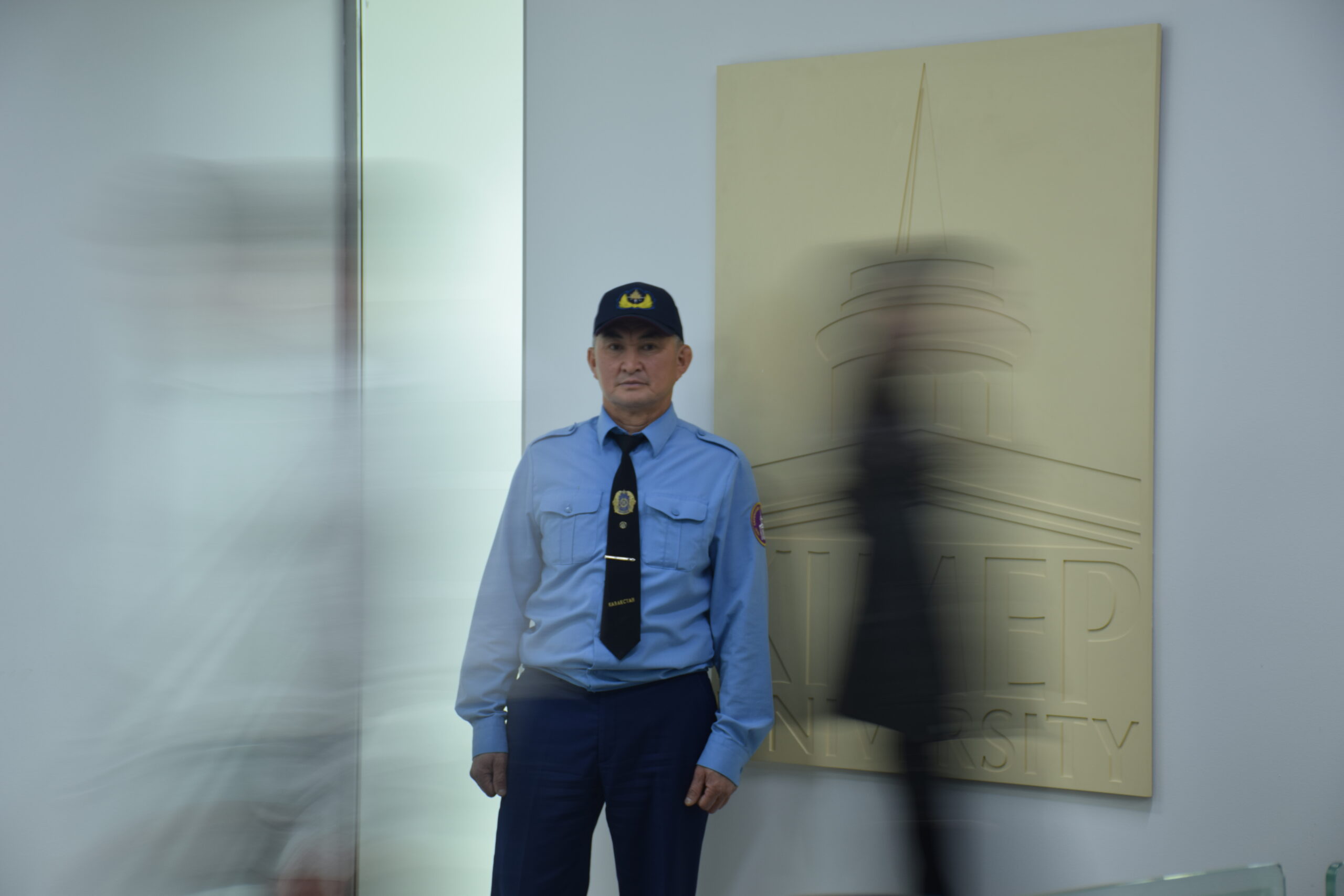Everyone remembers where they were during the January 2022 events.
The security guards at KIMEP University are no exception. Tolendi Nauryzbekov, 56, who has been working at KIMEP since 2008, was on campus then.
“During the January events, our security team stayed inside the university,” he said in Kazakh. “When we realized what was happening, we quickly coordinated. We turned off the lights, covered the ATMs to keep them hidden, and locked everything. We weren’t afraid, and as a result, our university remained untouched.”
Nauryzbekov was among KIMEP’s security forces to receive a certificate of appreciation for his work.

Nauryzbekov has been at the university for more than 15 years. But the sum of a person is often greater than the checked boxes on their CV. Nauryzbekov’s life experience has taken him from Czechoslovakia where he once worked. He had labored in construction, operated a radio during the war in Afghanistan, and even worked in law enforcement. Each experience becomes a puzzle piece fitting together to help him in his current position.
Like Nauryzbekov, Muratbek Khudaibergenov, 52, has a wealth of experiences. Prior to coming to KIMEP three years ago, Khudaibergenov has worked in construction, and security, as well as conducted criminal investigations and worked in prison services. Now he’s one of KIMEP’s 17 security inspectors.
Like many institutions, there is always a group of workers who are often overlooked and under appreciated. They cook our meals and mop our floors. They turn the turnstile green when we forget our student ID card. Sometimes, we don’t even see them as we pass by. But without ever thinking of themselves, they locked our doors, and turned off the lights during a cold January, when everyone in Almaty was worried about what would happen next. They kept us safe.
Both inspectors said that in this job, they need to be able to communicate with a wide variety of people, understand psychology, and stay calm under the pressure.
“We usually work in shifts, eight hours each,” Nauryzbekov said. “Our duties include maintaining order, ensuring proper student behavior, monitoring cameras, and responding to emergencies or disasters like earthquakes.”
“We also have special buttons that, when pressed, can bring the police here within minutes,” he added.
However, it’s not the button to the police that security inspectors press the most often.
“Upper-year students, especially boys, often forget their ID cards,” Naubyzbekov said. “I let in more than 50 people a day.”
“Sometimes it’s hard to remember all the new faces, especially when thousands of new students join,” said Khudaibergenov. “But over time, we get to know everyone’s faces, which is crucial for safety.”

Indeed, KIMEP’s security team will eventually remember the faces of students, but only if they actually come to the university.
Naubyzbekov said he remembers one incident when the parents arrived at KIMEP to visit their son. However, their child was not on campus because he was not a student. The parents were rightfully confused because they had been sending him money for two years to pay for classes and living expenses in Almaty.
“They found him a few days later,” Naubyzbekov said.
KIMEP’s security inspectors are often the watchful eye to students’ best and worst behavior – as well as their less graceful moments.
“If there are any misunderstandings, I always approach students with care, humor, and understanding,” said Nauryzbekov.
One time, Naubyzbekov was working at the entrance to the New Building when the large glass doors did not include the KIMEP logo. A boy and a girl were playfully chasing each other near the entrance. The boy, thinking the doors were open, ran straight into the glass and fell to the ground. The girl, shocked, feared the worst, thinking something serious had happened to him.
However, Naubyzbekov acted quickly. “I had a cup of water in my hand, so I splashed it on him,” he said with a smile.
The security forces, while prepared for anything, are still surprised by what they find around some corners.
“Once in 2013, during a patrol at 10 p.m., I saw a student who had fallen asleep,” Naubyzbekov said. “When I woke him up, he asked me what class was going on, even though all the classes had long finished.”
The security team also works closely with the residence hall, which houses hundreds of students.
“We also get help from the dormitory senior residents, who monitor the dorms and assist students. If something happens and we’re needed, they inform us,” added Khudaibergenov.

“We are like a link between the students, administration, and campus staff,” said Sofya Merzlyakova, a senior resident. “We work day and night in shifts. When students break the rules, we contact their parents and issue warnings. For example, coming back drunk results in a red warning, and three red warnings lead to expulsion from the dormitory.”
Each day is different, and they are constantly bombarded with questions. Students, teachers, and staff approach them asking for keys, or turning over a phone left in a classroom, so it can rest in a box under the desk and wait for a panicked student to find them later.
At one point during the interview, a KIMEP alumnus came up to Nauryzbekov and told him about a small car accident on the street. The details were vague, but the alumnus wanted security to know about it and keep their eyes on the cameras.
“We are the first people you see when you enter the university, so I feel responsible for this,” said Nauryzbekov. “Besides handling security systems, emergencies, and classroom protection, we also have to be welcoming.”

